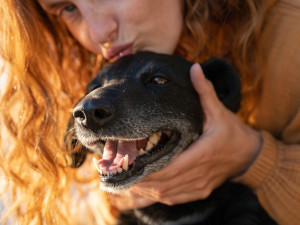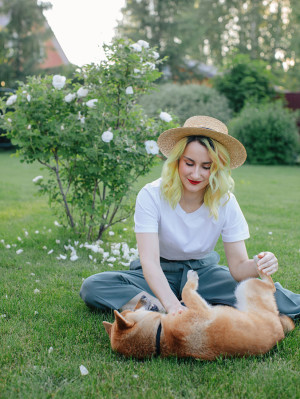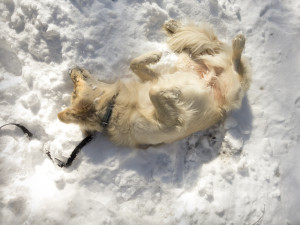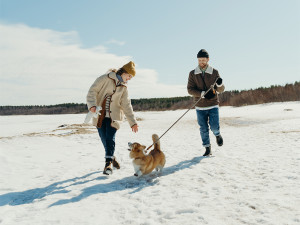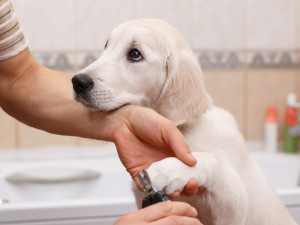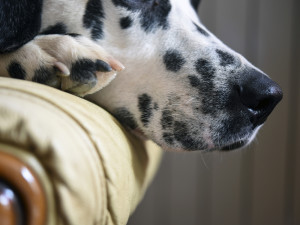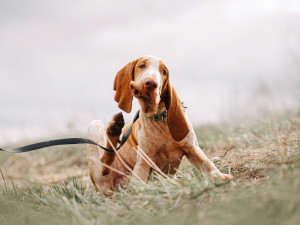Why Does My Dog Stink? Tips for Smelly Pups
Help! Why does my dog smell so bad?
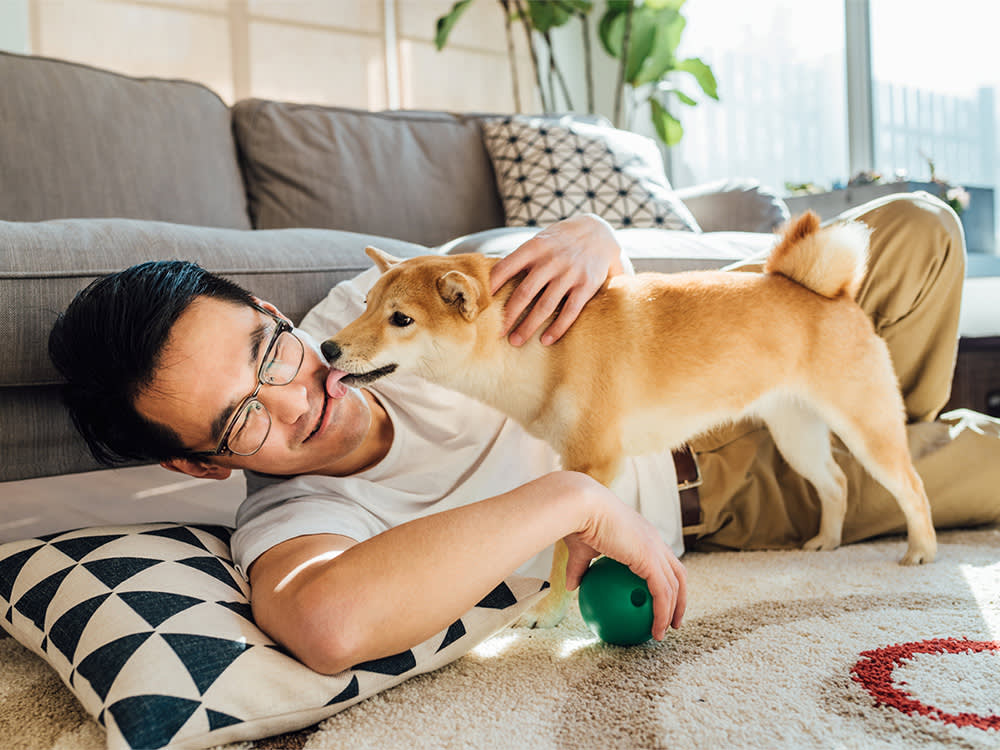
Share Article
Dogs and their people are virtually inseparable, even when they’re sleeping. Because of that close relationship, you’ll be the first to notice when something is a little off with them. Maybe they’ve started to smell a bit. If that sweet puppy scent vanished and was replaced by what can only be described as a pong, well, there might be other issues.
Strange smells could be caused by several things, such as dental problems, gas, disease or ear infections. But most commonly, it’s a hygiene problem. Yes, you do regular grooming, but somehow your dog still stinks. So, what’s going on with your whiffy pup?
Causes for a smelly dog
Wet dog smell
This recognisable smell is caused by the yeast and bacteria that naturally live in a dog’s skin and fur. The ordinarily mild odour becomes noticeably stronger when dogs are wet as the yeast and bacteria react to water.
Dental problems
One of the main culprits is bad breath, especially in older dogs. Like people, bad breath (halitosis) is caused by plaque and tartar on teeth. It’s important to brush your dog’s teeth regularly, just as you do yourself. Raw bones are great for teeth cleaning under close supervision. Consider visiting the vet for a professional check-up and cleaning, especially if you notice a rotten smell.
Ear infections
There are many causes of ear infections, including allergies, mites, excess hair, excess moisture, diseases and excessive cleanings. One thing that is certain is that ear infections in dogs can cause a really unpleasant smell. Dogs with especially hairy or floppy ears tend to be more prone to ear infections. Ear problems often manifest with scratching or rubbing at the ears, redness, discharge and of course, a nasty stink, says veterinary scientist Dr Alison Diesel.
Kidney disease
Beyond dental problems, bad breath may also be indicative of kidney disease or diabetes. Kidney disease is one of the top concerns among senior dog parents, and early signs include changes in body odour, bad breath and incontinence.
Gas
Dogs fart. We have to live with it. Thankfully, more than 99% of gasses that pass the intestinal tract are odourless. But, as a dog ages, their body and needs change. Excessive farting could be a sign of food intolerance or other diseases. If you notice an unusual concert erupting from your dog’s behind, reach out to your vet.
Impacted glands
If your dog is scooting around the carpet, your dog has an anal gland problem. These glands produce the foulest fish-smelling brown material. Typically, these glands empty naturally when a dog poos, but if not, then a vet visit may be in order. “For impaction, periodic manual expression of the anal gland contents may be sufficient,” says Dr Diesel. “Sometimes, changes in diet may help with the disease, or at least from expression being required quite as frequently.” Either way, it’s stinky business.
Skin infections
Some dogs and breeds are prone to skin-fold dermatitis. This smelly condition is the result of moisture caught between the warm folds of a dog’s skin. Breeds most commonly affected include Shar Peis, French Bulldogsopens in new tab, Pugs, Basset Hounds and Boxers.
How to improve smells
So, now that we’ve covered some of the common reasons why dogs stink, what can we do about it? If you confirm it’s not a medical issue after talking with your vet, then it’s a simple hygiene problem. The following tips can help you learn how to keep your dog and home smelling fresh.
Bathing
We know you’ve already been taking good care of your pup, but it’s time to up your game. A lot of changes begin to happen as a dog grows that can make them have a little extra stink. Baths will become vital in maintaining good hygiene for them and you, so experiment by washing them a little sooner than you usually would.
Bathe your dog no more than once every other week – and make sure to keep an eye on their skin because more frequent bathing could cause skin irritation. “Dogs without dermatological abnormalities benefit from a bath a couple of times a year or when they get dirty,” says Dr Diesel. “However, dogs with skin problems often require more frequent bathing and sometimes benefit from specific kinds or medicated shampoos. If your dog has a skin problem, you should discuss bathing recommendations with your vet.”
Laundry
How frequently should you wash your sheets? If you’re like most pet parents, you enjoy sharing your bed with your pup. Sleep quality aside, hygiene can become an issue. Pet parents should wash their bed sheets more often because of the extra dirt and oils.
People who sleep with their dogs are advised to wash their bed sheets more than average, every 3–4 days, especially if they notice a smell coming from their dog. Washing your bedding more often will not only help to improve the hygiene of your dog but also the aroma of your home.
In addition to your own bedding, wash your dog’s bed regularly. An easy tip for remembering this on schedule is to wash your dog’s bed and blankets on the same days you give them baths.
Maintenance
Once the stinky smell is gone, you’re going to want to maintain it for as long as possible. One easy way to do this is by regularly brushing your dog. Brushing your dog also allows your bedding to stay fresh for longer because you won’t have as much fur transferring onto them.
Next up, hoover regularly. Any pet parent can attest to the enormous quantity of fur build-up caused by most dogs. It does wonders to keep your home smelling fresh, plus it keeps away pests like fleas.
Use some dog-friendly scents. Studies have shown that some essential oils, namely lavender and chamomile, provide relaxing aromatherapy for dogs and make your house smell good, too.
Even though your dog may be smelly, it doesn’t mean you’ll snuggle with them any less. It’s important to keep close tabs on their body changes – smells included – in case there’s an underlying medical condition. It’s always important to consult your vet before making any sudden adjustments, as they can help you better understand what’s going on.

Daniela Lopez
Daniela Lopez is a digital media specialist and long-time contributor to The Bark.
Related articles
![Woman scratching belly of Shiba Inu while sitting on lawn near bush on summer day in yard.]()
The Reasons Behind Dogs’ Love For Belly Rubs
If one hand isn’t stroking a furry dog belly, what are you doing?
![Winterizing your dog's coat - Dog laying in the snow.]()
Natural Remedies for Dry Skin: How to Help Dry Skin on Dogs
Spoiler: the ingredients are probably already in your cupboard
![A happy looking man and woman walking their dog outside in a large snowy field.]()
10 Ways to Make Your Dog’s Life Better
Simple resolutions to boost your dog’s happiness, health and well-being all year long
![The-Wildest_Editorial_Puppy-grooming-tips_Hero_1000x750_v01.jpg]()
Puppy Grooming 101: Tips For Grooming Your New Puppy
Professional dog groomer Jess Rona’s puppy grooming tips
![Spotted dog with a close up of his nose]()
What to Do If Your Dog Has a Cracked, Broken or Torn Nail
A vet explains when you can treat the injury at home – and when it’s best to seek professional help
![puppy scratching fleas, get rid of fleas on dogs]()
Home Remedies for Getting Rid of Fleas on Dogs – Naturally
How to stop your home from becoming a flea circus


